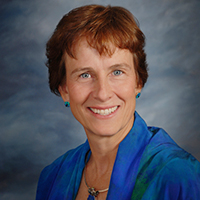
Director, George Washington Institute for Spirituality and Health
Professor, Dept. of Medicine and Health Sciences
George Washington University School of Medicine Professor, Health Leadership and Management George Washington University School of Public Health
Christina Puchalski, MD, MS, is a pioneer and international leader in the movement to integrate spirituality into healthcare in both the clinical setting and in medical education. As founder and director of the George Washington Institute for Spirituality and Health (GWish) at The George Washington University in Washington, DC, she continues to break new ground in the understanding and integration of spiritual care in a broad spectrum of healthcare environments. The spiritual assessment tool called FICA, which she developed, is used widely in clinical settings around the world. Medical education has been impacted in this country by a GWish-run awards program their curriculum.
Puchalski is a professor of Medicine and Health Sciences at The George Washington University School of Medicine. She is an active board-certified clinician in Internal Medicine and Palliative Care. She has received numerous awards including the George Washington University Distinguished Alumni Award in recognition of her scholarship and leadership. She is a fellow of the American College of Physicians and a member of Alpha Omega Alpha Honor Medical Society.
Dr. Puchalski is widely published in journals with work ranging from biochemistry research to issues in ethics, culture, and spirituality and healthcare. She has authored numerous book chapters and published a book with Oxford University Press entitled Time for Listening and Caring: Spirituality and the Care of the Seriously Ill and Dying. She published Making Health Care Whole through Templeton Press. Most recently, she is co-editor of an international textbook on spirituality and health published by Oxford University Press..
Puchalski is first and foremost a clinician. The cornerstone of her practice in internal medicine, geriatrics, and palliative care is integrating patients’ spiritual beliefs into their care, addressing sensitive medical issues facing seriously ill patients, and supporting healthcare professionals in their provision of compassionate care. Puchalski's work in the field of spirituality and medicine encompasses the clinical, the academic, and the pastoral application of her research and insights.
がん治療におけるスピリチュアリティ
要約
スピリチュアリティは、人々が意味や目的を見つける一つの手順であり、自己、他者、大切なこと、尊いものとのつながりをいかに経験するかということと定義されるi)。スピリチュアリティの次元は人間の経験において不可欠なものになっており、医療上特にがん患者において重要な因子と認識されてきている。多くの研究により、スピリチュアリティと患者アウトカムの多様性(QOLや疾患への対応などを含む)との関係が示されている。診断に始まり、治療の時期を経て、サバイバーシップ、再発、そして死、患者が自分の病気や病気をもちながら生きることを理解するということ:これらは身体的、社会的、心理的、そしてスピリチュアルなことにまで及んでいる。がんと診断されることにより、スピリチュアリティに関連した問いや関心が浮上してくる。これは、実存的で神聖なものである。がんは、しばしば意味や目的についての問いを深く考えるきっかけになる。これは、がん治療の遍歴、希望や実現可能なことなどの深い問題も含んでいる。スピリチュアリティは、がん患者のQOLの重要な構成要素の一つでもある。がん患者のQOLは、スピリチュアル的に満足のいく状態であり、身体的、精神社会的にも同様に満足である状態を含んでいる。ii)
長い間、がんは先の命が短いということを示してきたが、科学の進歩によりがん患者の生命は長くなってきており、そのような患者の多くが、現在サバイバーと考えられる人々である。サバイバーとは、病気を持ちながら生活したり、長期間治療の後遺症をもって生活を送っている人々のことを意味するiii)。このように、今日の医療現場での問題は、死が差し迫っていることに対して考えて計画すること(planning)より、むしろがんの経過全体を通してがんとともにうまく生きていくということについて語ることのほうが議論の中心となってきている。
NCCN(National Comprehensive Cancer Network)は、スピリチュアルな苦悩は継続的なケアと共に拡がっていくかもしれないと同定しているiv)。継続的なケアを通して、がん患者の精神・スピリチュアル的、そして身体的なニーズに関わっていくことが詳しく記述されており、患者の希望することについての見通しや患者のQOLに対して利点になることなどが示されている。スピリチュアルケアの専門職連携のモデルが、このケアにおける不可欠な部門として訓練されたチャプレンが加わり発展してきている。熟練したスピリチュアルケア専門家である認定専門チャプレンと仕事をすることは、患者のスピリチュアルな問題に関わっていくことに必要なものである。しかし、医療ケアチームの全てのメンバーは、患者の苦悩(スピリチュアル、精神社会的、身体的苦悩)の全ての面に注意をはかることに責任をもたなければならない。それゆえ、臨床医が患者のスピリチュアルな問題、診断、スピリチュアルな苦悩の治療に関心を向け、患者のスピリチュアルな問題を解決する方策のような強みを患者の治療計画に組み合わせることは重要なことである。
- i Puchalski CM, Ferrell B, Virani R, et a.(2009). Improving the quality of spiritual care as a dimension of palliative care: The report of the consensus conference. J Palliat Med,12(10), 885-904
- ii Cohen SR, Mount BM, Tomas JJ, Mount LF (1996). Existential well-being is an important determinant of quality of life: Evidence from the McGill quality of life questionnaire. Cancer, 77:576-586
- iii Ferrell BR, Hassey-Dow K, Leigh S, Ly J, Gulasekaram P (1995). Quality of life in long-term cancer survivors. Oncology Nursing Forum, 22(6):915-922
- iv Jacobsen PB, Ransom S (2007). Implementation of NCCN distress management guidelines by member institutions. Journal of the National Comprehensive Cancer Network, 5(1):93-103
(邦訳:小池和彦)










